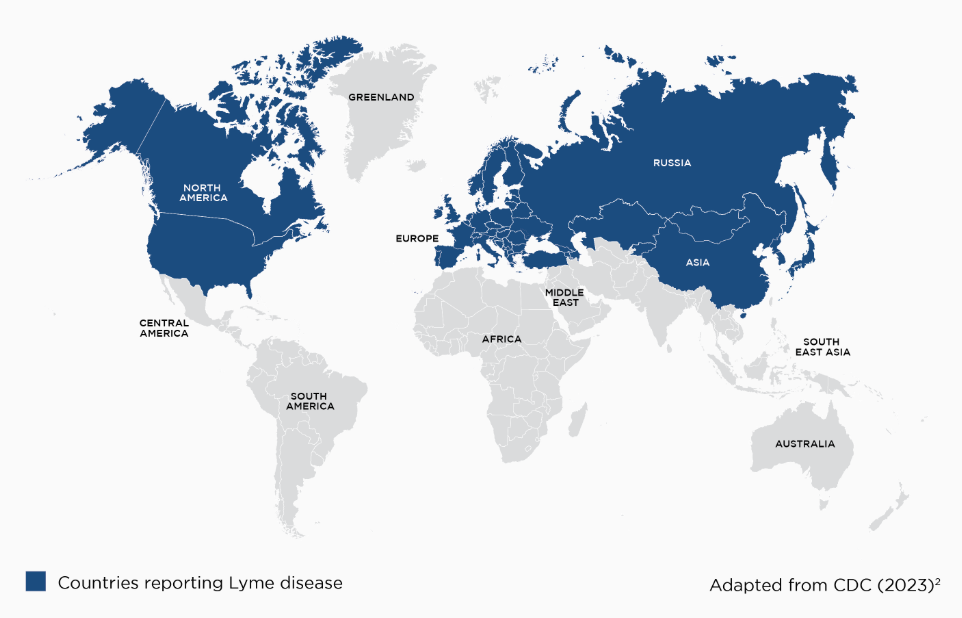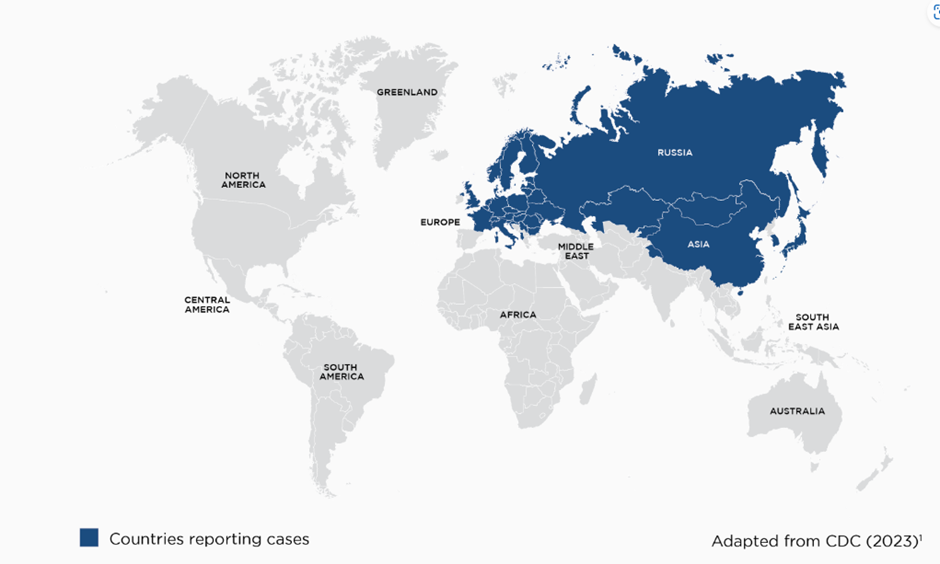Risks from tick bites
The risks from tick bites can range from a minor inconvenience to a serious illness. The bite itself can be itchy or painful, the bite could become infected, or a disease could be passed on. There is also a possibility that part of the tick remains in the skin during removal which can cause skin irritation. Some symptoms from a tick bite can take 2-3 months to develop so there is a risk that people don't associate their symptoms with being bitten by a tick which could delay treatment.
Let’s look at some of the diseases that can be passed on from tick bites in the UK. There are diseases from ticks in other countries but most present with symptoms of fever, aches/pains and/or a rash. Any patient that presents to the pharmacy with a fever and a suspected tick bite (especially if the bite was from outside the UK) should be referred onwards.
Lyme Disease
Lyme disease, also know as Lyme borreliosis, is a bacterial infection usually caught by being bitten by a tick carrying the Lyme disease-causing bacteria, Borrelia burgdoferi. Infected ticks are found in northern hemisphere countries such as North America, the UK, Europe, Russia and China. It is the most commonly acquired tick-borne infection in the UK.
Map to show countries of the world where infected ticks are found:
Lyme Disease | Beware of the Bugs
Lyme disease can affect any part of the body and cause many different symptoms. The average time from the bite to symptoms appearing is 14 days but it can take as long as 3.5 months.
The most common symptoms are:
- Flu like symptoms
- The “bulls-eye” rash called erythema migrans
- Headache
- Stiff neck
- Muscle pain
- Tender glands
- Sensitivity to temperature, sound and light levels
These symptoms can vary from person to person and change as the disease develops to include extreme tiredness and disturbances of the central nervous system.
If there is a possibility that the patient has Lyme disease you should refer them to a GP as they will need treatment with antibiotics. You can read more about the diagnosis, management and treatment of Lyme disease in NICE guideline NG95.
At present there is no vaccination for Lyme disease so the only way to prevent the disease is to avoid being bitten by ticks (see how to prevent tick bites).
Diseases Similar to Lyme Disease
There are a number of tick-borne diseases that have similar symptoms to Lyme disease. Ticks carrying them are more prevalent in Europe but can be found in the UK. Most respond to the same antibiotics as Lyme disease and there are no clinical tests for them. You can read about these on the Tick-borne diseases | Lyme Disease Action website. If you suspect a patient to have one of these you should refer them to a GP as you would if they had Lyme disease symptoms.
Tick Borne Encephalitis
Tick Borne Encephalitis (TBE) is a viral infection usually caught by being bitten by a tick carrying the virus that causes TBE. Infected ticks are found in European and Asian countries and more recently, the UK.
Map to show countries of the world where infected ticks are found:
Tick Borne Encephalitis | Beware of the Bugs
TBE can also be contracted by consuming unpasteurised milk dairy products from infected animals but this is very rare.
The symptoms of TBE take on average 7 days from the bite to appear but it can be as long as 28 days. Approximately 2/3 of cases are asymptomatic.
The most common symptoms are:
- High temperature
- Tiredness
- Headache
- Aches and pains
- Feeling sick
Most cases will get better by themselves but for some patients there is a second phase of disease that spreads to the brain and causes more serious symptoms including:
- Stiff neck and severe headache
- Pain when looking at bright lights
- A fit
- Change in behaviour, confusion or slurred speech
- Weakness or loss of movement in part of the body
If there is a possibility that the patient has TBE you should refer them to a GP as they will need treatment.
There is a vaccine for TBE available which is recommended for patients travelling to TBE endemic countries and planning on completing outdoor activities whilst they are there. This should be combined with advice on avoiding being bitten by ticks (see how to prevent tick bites). You can find out more about delivering the vaccine as part of a travel service on NumarkNet.
You can read more about TBE here Tick-borne encephalitis (TBE) - NHS


